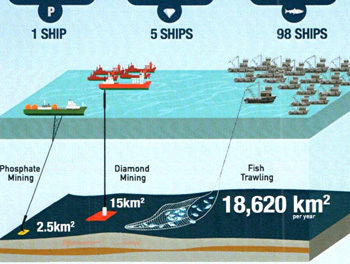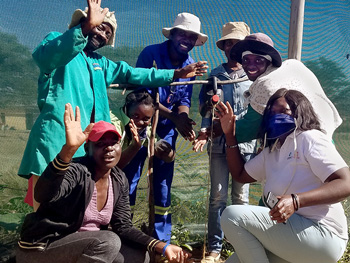
Ban plastic bags in support of Sustainable Development Goals

Dr Chris Brown and Elize Shakalela helped the Namibia Scientific Society in March to launch their campaign for a plastic free Namibia.
Dr Brown is the Chief Executive of the Namibian Chamber of Environment and Miss Shakalela is an independent environmental legal consultant. She is also Miss Earth Namibia 2016.
The plastic-free Namibia campaign is a partnership between the Namibia Scientific Society, the Namibian Chamber of Environment and avid environmentalists comprising Hon. Sophia Swartz, the Chairperson of the Parliamentary Standing Committee on Natural Resource Management, PDK, Miss Shakalela and The Dogg, the entertainer responsible for campaign awareness.
“The impact of plastic bags on our environment, agriculture, marine life, livestock and wildlife is hardly stressed with importance. The concept of a plastic-free environment campaign was birthed in August 2016 during my visit to the northern part of Namibia when I saw a herd of cattle feeding on improperly disposed plastic bags” said Shakalela adding that plastic bags lying around as rubbish have caused many mortalities among domestic stock.
The worst impact of improper plastic disposal is often observed in the ocean where it accounts for up to 95% of rubbish. Based on this, in 2005 the United Nations Environmental Programme which primarily coordinates environmental activities and assist developing countries to implement sound policies and practices, made a call to promote the global ban of plastic bags, particularly to curb marine littering. Although plastic bags are marked with words such as “reduce, reuse and recycle,” most plastic bags are not properly discarded after a single use.
As a comparison of the energy required to produce plastic bags, the Pacific Regional Environment Programme has reported that the amount of petroleum used to make a single plastic bag would drive a car about 115 metres. It takes only seven bags to drive one kilometre.
The plastic-free environment campaign rests on the call to ban plastics by UNEP as well as the Sustainable Development Goals, No.6 on clean water, No.13 on Climate Action, No. 14 on life below the waters and No.15 on life on land.
The campaign is in line with the principles outlined in Agenda 2063, the Africa We Want where it is stated that Africa must act with urgency on issues relating to climate change and the environment.
The plastic-free environment campaign also advances the implementation of the state principles of conservation and preservation as articulated in Article 95 (l) of the Namibian Constitution, the Environmental Management Act, the Water ordinance Act, Nature Conservation Ordinances, the Policy on Climate Change and the Harambee Prosperity Plan.
Through collaboration with relevant stakeholders, the campaign strives to discourage the use of plastic bags by developing plastic-free mind-changing educational strategies and by stimulating discussions with a view to plastic-free legislation.
Photographs by Hartmut Voigts for the Namibia Scientific Society.













































